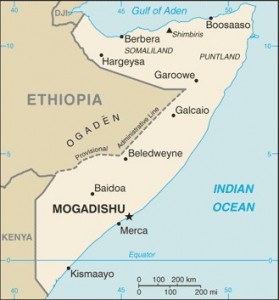The United States is considering increasing its military aid to the African Union’s mission in Somalia following a formal announcement of a merger between the Somali militant group al-Shabab and al-Qaeda.
 Ayman al-Zawahiri, al-Qaeda’s leader, made a formal announcement of an alliance with al-Shabab. This has prompted the U.S., which has been supporting Somali and African Union troops to fight al-Shabaab, to consider sending additional assistance to their proxies.
Ayman al-Zawahiri, al-Qaeda’s leader, made a formal announcement of an alliance with al-Shabab. This has prompted the U.S., which has been supporting Somali and African Union troops to fight al-Shabaab, to consider sending additional assistance to their proxies.
Supporting proxies in Somalia is only one element of a much broader policy in East Africa, however. The U.S. is also believed to be supporting the Kenyan military in its assaults on southern Somalia for many months now. Additionally, the Obama administration sent about 100 combat troops to Uganda, Somalia’s neighbor to the east, to fight the rebel group Lord’s Resistance Army in exchange for Ugandan troops keeping up the fight against al-Shabab.
This new strategy in Africa indicates a shift into the shadows, for these are interventions nobody knows about. It is characterized by military aid to and reliance on brutish, undemocratic regimes, proxy militias, drones, and targeted special operations. All of this is done without the consent of Congress and for the most part in secret.
But building U.S. militarism in East Africa has worsened conditions considerably and incited more violence, probably inducing an embattled al-Qaeda to embrace al-Shabab, which it had been reluctant to do for so long.
In a recent piece in Foreign Affairs published only a matter of days before Zawahiri’s announcement, professor of international affairs at Qatar University Afyare Abdi Elmi and journalist Abdi Aynte argued “military involvement in Somalia has been counterproductive” and that “the time is riper than ever” for negotiations with the militants. That opportunity has almost certainly been lost.
But even the Obama administration has quietly acknowledged the fact that their military involvement in Somalia may create more problems than it solves, with one administration official telling the Washington Post in December there is a “ concern that a broader campaign could turn al-Shabab from a regional menace into an adversary determined to carry out attacks on U.S. soil.” Nevertheless, the U.S. appears only to be doubling down.


